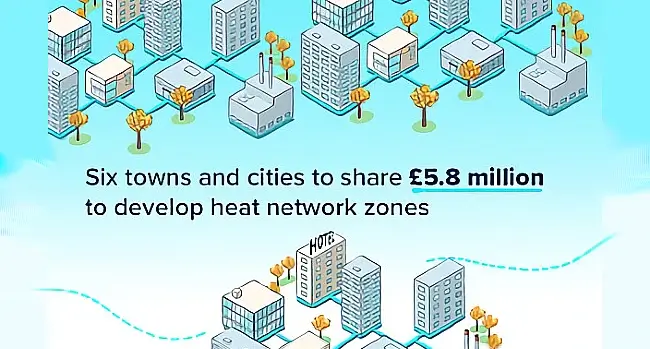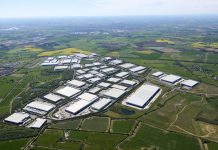Businesses and building owners across England are set to benefit from low-cost, low-carbon heating as 6 towns and cities have been selected to develop the country’s first heat network zones.
Developing zones for heat networks in urban areas is the cheapest and most efficient way of delivering the technology, which recycles excess heat – generated for example by data centres or from factories – to enable the heating of several buildings at once.
The ground-breaking schemes in Leeds, Plymouth, Bristol, Stockport, Sheffield, and 2 in London will receive a share of £5.8 million of government funding to develop the zones, with construction expected to start from 2026. This will help to create tens of thousands of jobs including engineering, planning, manufacturing and construction roles.
Heat network zones use data to identify the best spots and help to plan and build the technology at scale. They require suitable buildings, such as hotels and large offices, to connect when it is cost-effective for them to do so.
Minister for Energy Consumers Miatta Fahnbulleh said, “Heat network zones will play an important part in our mission to deliver clean power for the country, helping us take back control of our energy security.
“As well as energy independence, they will support millions of businesses and building owners for years to come, with low-cost, low carbon heating – driving down energy bills.”
Excess heat from data centres – which would otherwise be wasted – will provide heating in the Old Oak and Park Royal Development, while the system planned in Leeds will take heat from a nearby glass factory to warm connected buildings.
Developing heat networks across the country has the potential to create tens of thousands of jobs through delivering a low-carbon heating transformation.
Types of buildings that could connect to a network include those that are already communally heated, and large non-domestic buildings over a certain size, such as hospitals, universities, hotels, supermarkets, and office blocks.
The 6 selected towns and cities are part of the government’s plan to accelerate the delivery of heat networks across England in areas where zones are likely to be designated in the future.
CEO of the Association for Decentralised Energy Caroline Bragg said, “We are delighted to see government maintaining its support for the heat network sector. Heat network zones are crucial for a just transition for our communities – putting the UK on the lowest cost pathway to decarbonising our heat, attracting more than £3 of private investment for every £1 of public funding given and creating tens of thousands of local jobs.
“As we begin to deliver zoning at scale, it is crucial that the government and industry continue to work together to ensure heat networks can truly unleash their potential.”
Philip Kaye, co-founder of Manchester based data centre firm Vespertec, has long been a staunch advocate for a wide government-backed rollout of this technology to support communities and cut the industry’s carbon footprint, said, “These heat network zones are a great way for data centres to give back to local communities. The most effective way to capture heat is by using liquid cooling. Historically most datacentres relied on air cooling. As servers become more powerful, liquid cooling will become a mainstream technology especially with AI servers. For example, Nvidia’s NVL72 requires liquid cooling.
“Liquid cooling is more efficient than air-cooling, meaning liquid cooled datacentres can achieve a lower PUE (Power Usage Effectiveness) making them more sustainable. The environmental impact can be further reduced if the waste heat is reused. This can be done by redirecting the heated liquid and using it for another purpose such as heating a building or any other infrastructure.
“We’re delighted to see our town of Stockport selected for this programme, and looking forward to seeing more of these schemes open up across Great Manchester and the UK.”




